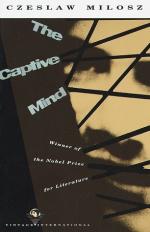|
This section contains 557 words (approx. 2 pages at 400 words per page) |

|
Ketman Summary and Analysis
Citizens in the people's democracies do not express their opinions or questions openly. They act in an appropriate manner consistent with what is expected of them. Their comments are always guarded, unlike those of Westerners. They do not speak freely. They are basically actors, according to Milosz. Milosz finds an analogy in Islam in the character of Ketman, which he learned about from Religions and Philosophies of Central Asia written by Gobineau.
Gobineau felt that people should not reveal their true beliefs unless silence is taken as assent. The individual is allowed to go to any lengths to deceive his adversary. This is Ketman. Rulers and successful people practice Ketman, and it also must be practiced in the people's democracies. It is a way of hiding one's true feelings and beliefs. They outwardly support the Russian regime.
Many of the Eastern...
(read more from the Ketman Summary)
|
This section contains 557 words (approx. 2 pages at 400 words per page) |

|




